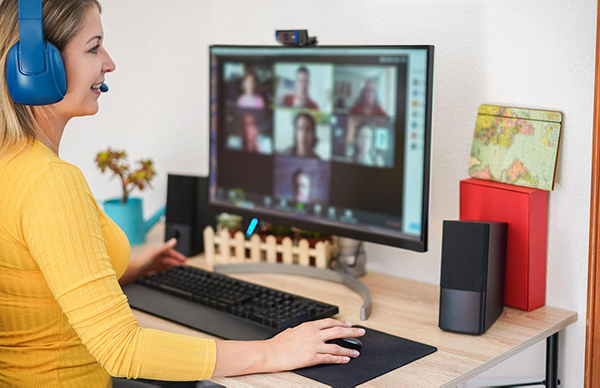
We’ve all been spending a lot more time online in 2020—shopping, Zooming, Instagramming, maybe/sometimes working—and as we look ahead through the fall and beyond, the horizon is becoming clear. For businesses and their staffs, for employees thinking of making a move in an uncertain job market, and for those trying to upgrade or retool their skills, the future is virtual.
Employment moves often hinge on learning, and these days learning will be remote. The idea has been around for decades. Long before Zoom, institutions delivered correspondence courses to those unable to attend classes in a traditional setting. But online education didn’t enjoy a similar prestige. In part, the blame lay with the technology: rudimentary discussion boards, un-user-friendly learning management systems. None of it left instructors, never mind students, optimistic about the future of learning.
Now there’s MasterClass, which offers a shinier, happier version of what virtual education might be. The idea behind MasterClass, founded in 2015, is to give online education, as journalist Jake Nevins put it in a recent New York Times story, “the same sheen of prestige that HBO bestowed upon the three-camera sitcom and that TED Talks brought to the airport book.” Yes, the marketing for MasterClass is insidious—using movie-like trailers, inserted into your social media feed, to promote a 14-lesson course on storytelling and humour by David Sedaris, or a 12-lesson course on creativity and leadership by Anna Wintour. And yes: you can’t really teach humour, or creativity—at least, not in a pedagogically sound way.
In the online world, with countless distractions to what we “should” be doing, businesses will have to do a better job of making online interactions with employees and clients fun—and entertaining.
But there’s little doubt that MasterClass has seized this stay-at-home moment. Subscribers are spending twice as much time on the online platform since the pandemic started, according to the Times story, and the privately held company behind it (Yanka Industries, Inc.) attracted another $100 million in private investment in mid-May. Subscribers want to be inspired by experts as much as they want to develop a new skill set—and that’s as close to the Platonic ideal of education as any.
So what exactly are the lessons to be learned from MasterClass for those who now have to market their business or share knowledge in a primarily virtual world?
- Shoot for the stars. Having a celebrity associated with your brand doesn’t hurt—or 80-plus, if you are expecting people to pay $240 a year for your services. Even if you can’t get Michelle Obama to drop in as a guest speaker for your virtual AGM, sharing a clip from her Netflix documentary is doable (and affordable). Key to incorporating bold-faced names is ensuring they are good storytellers—and that their insights are worth sharing.
- Be surprising. While most of the MasterClass lecturers are household names, others are anything but. For a course on personal finance and negotiation, for instance, MasterClass hired former FBI hostage negotiator Chris Voss. It’s one of their most popular classes—in no small part because Voss has stories to tell that nobody else has.
- Keep it short. Each lesson at MasterClass is, on average, about 10 minutes. Already we’re hearing about “Zoom fatigue,” with everybody working or learning remotely, and the situation is only going to get worse. The future of our work will, by necessity, follow the 80/20 rule—with 80% of your offering offline (or at least, off-platform) and 20% online. In the case of the David Sedaris course, each student is provided a 38-page workbook, with a list of suggested readings, tips and assignments.
Critics of MasterClass argue that it’s a one-size-fits-all solution to education, where you can’t ask questions of instructors or have a two-way conversation—hallmarks of a vibrant learning environment. But in the online world, with countless distractions to what we “should” be doing, businesses will have to do a better job of making online interactions with employees and clients fun—and entertaining. If nothing else, that’s a skill that MasterClass has mastered.





